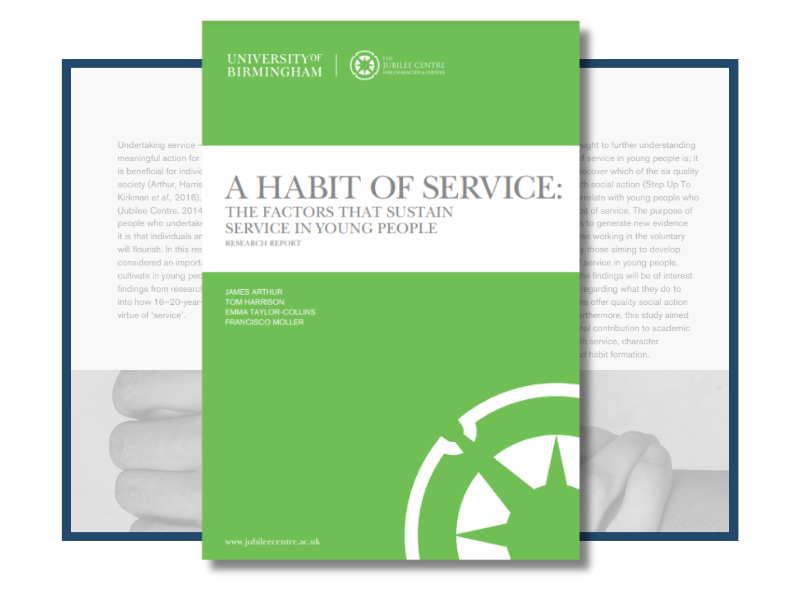Project Overview
The A Habit of Service project was launched on 22nd November 2017 at the Tower of London by Dame Julia Cleverdon, Co-founder of Step up to Serve and Michael Lynas, CEO of National Citizen Service. The project is the largest known study of its kind and reports on evidence gathered from over 4,500 16-20 year olds about the factors that are associated with young people who have made a habit of service.
This report contributes to the Jubilee Centre’s wider investigation into how schools, youth social action providers, and other organisations build character virtues in order to transform lives and contribute to a flourishing society.
An overview of the key findings from this research can be found in this Infographic.

Summary of Key Findings
- those who first get involved in service under the age of 10 were found to be more than two times more likely to have formed a habit of service than if they started aged 16–18 years
- they are also more likely to be involved in a wider range of service activities and participate in them more frequently
- they also identify themselves more closely with exemplars of moral and civic virtues
Summary of Key Recommendations
- schools and other institutions should consider how they can play a role in supporting young people to continue participating in service through key transition points
- the opportunity to take part in and build a habit of service is extended to adults, given that the involvement of parents in service is related to their children’s involvement. This will enable a culture of service to become the norm with adults as well as young people
Project Summary
Project Overview

The Jubilee Centre for Character and Virtues has pledged to support the #iwill campaign by researching the connection between youth social action and character development.
#iwill is a UK-wide campaign helping more young people make a difference in their communities through social action that includes activities such as campaigning, fundraising and volunteering. Youth social action has a double benefit – it helps build communities and develops character strengths and life skills in young people. Many business, education, voluntary and public sector organisations have pledged to spread the word about the benefits of youth social action and create more opportunities for young people to get involved.
The #iwill campaign’s aim is to make social action a ‘habit for life’, but there is not yet evidence on what this habit is. This project will focus on the character virtue of service to investigate: what is a habit of service for young people in the UK?
This research will contribute significantly to scholarship on young people and service, and broaden the way in which habits are considered across disciplines. The findings of the project will encourage other researchers to explore these areas and adopt a broader definition of ‘habit’. There is also a lack of quantitative research in this area, so this study will make a significant contribution to the academic field. The initial research for the project has already impacted on the field as questions relating to habit were subsequently added into Step Up To Serve’s annual survey of participation in youth social action for 2015.
The dissemination of this research will lead to changes to the ways in which organisations encourage young people to participate in service. The findings will inform those in the voluntary sector about the appropriate use of language around making service a ‘habit for life’ and about what that habit is and how it might be promoted.
Furthermore, where currently practitioners often ask young people about future intentions to participate in service, and use that as a measure of habit, this research will encourage them to think about habit in a broader sense and ask more probing questions, thus enhancing their understanding of what a habit of service is, and how it can be developed. Our research will also influence practice because it will encourage providers to consider which aspects of their programme might have the most significant impact on young people’s habit formation, and may market their programmes differently as a result to encourage more young people to participate. Ultimately, this project will help the #iwill campaign to achieve their goal of making service the norm for young people across the UK by 2020.
Methodology
Following a literature review into habits and youth service, for this project we have conducted a survey with over 4,500 young people to define a habit of youth service, and explore which factors correlate with young people who have made a habit of service. This has been followed by in-depth interviews with a small number of young people who have made a habit of service.
Literature Review & Findings
The literature review, exploring psychological and philosophical studies, showed that habit is malleable, and that it both manifests and is maintained in the prior, current, and intended future repetition of a behaviour. Additional factors that are considered an important part of habit are that the behaviour is: part of an individual’s moral identity; in keeping with subjective norms; and possible – and that the individual must believe the behaviour to be possible. A habit may also be goal-directed and automatic. Habits can also be measured, though no previous study has tested a habit of youth service in the UK.
Project Milestones
- July-September 2016: Survey conducted with over 4,500 young people.
- January-March 2017: Qualitative research conducted with a small group of young people.
- Spring/Summer 2017: Consultation with youth service providers and ‘best practice’ guide developed.
- Autumn 2017: Launch of research report
Partners
This project is partnering with youth social action providers including vInspired, NCS, the Diana Award, and Envision, as well as schools and colleges including The Priory School, East Kent College, Canterbury College, QEGS, and UWC Atlantic College.
